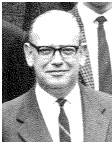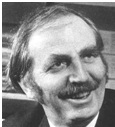|
 |
|
 |
Alan Fox (1920-2002)
British industrial sociologist at Oxford University (pictured right) where, along with Allan Flanders (middle picture right), Hugh Clegg (bottom picture) and others he became part of the ‘Oxford school’ of industrial relations. Their ideas greatly influenced The British Royal Commission on Industrial Relations in 1968 (often known as the Donovan Report), for which Fox wrote his booklet, Industrial Sociology and Industrial Relations (see below). Key books Industrial Sociology and Industrial Relations (1966) There are two ways of looking at the relationship between management and employees (called “frames of reference”):
1. Unitary This views the organization as a team harmoniously pursuing common objectives like
profit So the interests of management and employees coincide and the organization can fairly represent the workforce .
2. Pluralistic This views the organization as a coalition of different interests leading to areas of conflict in organizations e.g. higher profits leading to lower wages and more stressful, boring work. Trade unions (not management) are the best way to represent the workforce by negotiating better wages and working conditions through collective bargaining.
Key quote In place of a corporate unity reflected in a single focus of authority and loyalty, we have to accept the existence of rival sources of leadership and attachment.
Beyond Contract (1974) Here Fox added a third “radical” frame of reference which is closely associated with Marxism. This says there are conflicts of interest between management and employees but they can’t be overcome because businesses always exploit employees. The overthrow of capitalism is the only way to overcome this conflict
|
|
|
||
|
|
|
||
|
||
| Copyright © wisdomtowin.com All Rights Reserved | ||
|




